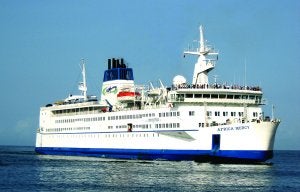
Norwegian seafarer training specialist, Seagull, has donated software to Mercy Ships, the operator of the world’s largest non-governmental hospital ship, the Africa Mercy.
Mercy Ships provides free health care, community development, health education and agriculture projects, mental health programmes and palliative care.
"The donation from Seagull increases the skills of our crew, and the onboard training programmes will allow us to direct even more of our resources to the people of Africa," said Arvid Solheim, national director, Mercy Ships Norway. "Prior to this donation it was necessary for Mercy Ships to fly crew away from the ship for training courses. The fact that the training is now available onboard our ship means the benefits of Seagull’s donation are two-fold."
Captain Lance Savaria, director of sales and marketing , Seagull Norway said it was the company’s hope that the donation of seafarer training software to the Africa Mercy would benefit the seafarers working onboard.
"We are very proud to make this practical contribution to such a worthy cause and look forward to supporting Mercy Ships well into the future. We urge others in the maritime community to provide their support in whatever way they can," Captain Savaria added.
The Africa Mercy has the capability to perform approximately 7,000 surgical tasks each year and is currently in the final month of a ten-month field service deployment in Sierra Leone, a country the charity has visited seven times over the last 19 years. Once this is completed, the vessel will sail to Ghana for a scheduled dry-docking before undertaking six months field service in Togo.
Mercy Ships is headquartered in Garden Valley, Texas, and operates from 17 resource centres in Australia, Belgium, Canada, Denmark, France, Germany, The Netherlands, New Zealand, Norway, South Africa, South Korea, Spain, Sweden, Switzerland and the United Kingdom.
The organisation was founded by Don and Deyon Stephens who, in July 1978, acquired the first vessel, the retired ocean liner Victoria, for around £600,000. Over the course of the next four years the vessel was transformed into an 11,701t floating hospital with three operating theatres and a 40-bed ward.

